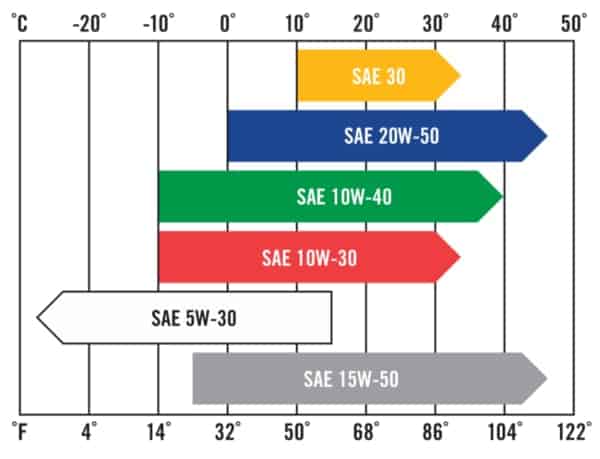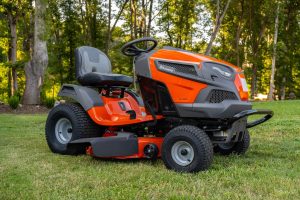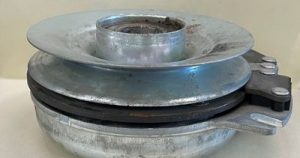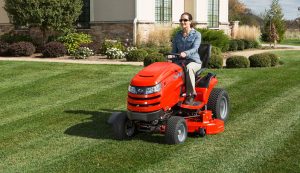11 Reasons a Lawn Mower Quits When Hot
No one wants to have to deal with a lawn mower that shuts down in the middle of mowing. However, as a lawn mower owner, there’s a good chance this will happen sometime during the life of your mower.
I’ve put together a list of the most common items that can cause your mower to quit when it gets hot.
A lawn mower that quits when hot is caused by a plugged air filter, a clogged mower deck, an incorrect engine oil level, a bad spark plug, a faulty ignition coil, old fuel, or a plugged fuel cap.
Before you begin working on your lawn mower, follow the safety instructions in your owner’s manual to prevent injury.

This post may include affiliate links. Purchases made through these links may provide a commission for us, at no extra cost to you. As an Amazon Associate, we earn from qualifying purchases.
Follow all safety instructions provided in your equipment operator’s manual prior to diagnosing, repairing, or operating.Consult a professional if you don’t have the skills, or knowledge or are not in the condition to perform the repair safely.
Table of Contents
Reasons Your Lawn Mower Quits When Hot
Plugged Air Filter Causes a Lawn Mower to Quit
The air filter is a preventative maintenance item crucial to protecting your engine from dirt and debris contamination. The air filter must be kept clean to allow air to pass through the filter.
When it isn’t kept clean, a plugged filter will restrict airflow and cause the engine to get hot and quit. It is best to start each season out with a clean filter.
Then check and clean it several times throughout the mowing season. You’ll want to clean it or replace it more often when you are mowing in dusty conditions.
Cleaning a filter is a simple task that can prevent your lawn mower from overheating and shutting off.
Repair: Clean your air filter by removing it from the air filter housing. Be careful and don’t knock dirt into the air intake.
Wipe out any dirt that remains in the housing with a dry clean cloth. Follow these instructions to clean your filter type:
Clean a paper lawn mower air filter:
- Tap your paper filter element against a solid surface to loosen and remove dirt. Get as much dirt out as possible. Do not use compressed air to clean the filter as this will damage it.
- Hold your filter up to a light source to check for light shining through the paper.
- Reuse a filter where you can see light through the paper. Replace with a new air filter when you cannot see light.
- Install the filter into the air filter housing and reattach the housing cover.
Clean a foam lawn mower air filter:
- Check the condition of your foam air filter. Replace it with a new one if you notice it is dry, brittle, has any tears, or has developed brown spots.
- If your filter is in good condition, proceed with washing it with mild dish soap and water. Remove the dirt and oil from the filter.
- Rinse the filter until it rinses clear and all soap has been removed.
- Lay flat to air dry. Place it in the sun to help it dry faster.
- Use filter oil to coat your filter. Squeeze out any excess oil from the filter. You don’t want the filter to be dripping oil.
- Reinstall the filter into the filter housing and reattach the cover.
Bad or Old Fuel Causes a Lawn Mower to Quit
Running fresh gasoline through your mower with a low ethanol content will reduce the fuel and engine problems you experience due to old fuel. These problems include fuel restrictions that cause the engine to die after running.
In addition to the ethanol and moisture leaving behind a gummy sticky solution, it will also separate from the gasoline and sink to the bottom of the fuel tank.
When this solution runs through the engine it will cause your engine to run hot and potentially quit. Gas-powered lawn mowers require unleaded gasoline with a minimum octane rating of 87 and a maximum ethanol content of 10%.
The less ethanol content, the better for the small engine in your lawn mower. Read more about the right gas to use here.
Repair: Drain your fuel tank into an approved fuel storage container using a siphon. Fill your lawn mower with fresh fuel. Add a fuel additive to clean and stabilize your fuel.
I recommend a product called Sea Foam Motor Treatment. It is a petroleum-based product that won’t hurt your engine. It contains cleaning agents for your engine and fuel system. Read more about why I prefer Sea Foam here.
Dirty Carburetor Causes a Lawn Mower to Quit
The carburetor regulates the amount of fuel that mixes with air to form a combustion. Old fuel can cause the carburetor to gum up preventing the engine from getting the fuel it requires. A lack of fuel will cause your mower to quit.
Before tearing the carburetor apart to clean it, perform a couple of steps to confirm your running problem lies with your carburetor. First, make sure you are getting fuel to the carburetor.
Second, remove the air filter and spray carburetor cleaner into the air intake. Start your mower. If it runs for a bit and then shuts down, you will need to disassemble your carburetor and clean it.
Repair: If you are a little mechanical and don’t mind working with a lot of small parts, you should be able to handle cleaning your carburetor. Follow the instructions in this article to clean the carburetor on your lawn mower.
You can also have your local lawn mower repair shop clean the carburetor if you choose to not tackle the task yourself.
Wrong Type of Engine Oil Causes a Lawn Mower to Quit
The best kind of oil for your lawn mower is air-cooled engine oil that contains a high concentration of zinc. Zinc is used as a cooling agent.
The cooling procedure differs from cars. Cars use liquid to cool their engines and small engines use air for cooling. Most lawn mower small engine manufacturers recommend using SAE30 or 10W-30 engine oil.
While this is the recommendation and good for most areas, you may have to change to using a different viscosity, like 20W-50 when operating in higher ambient temperatures.
Use this chart provided by Kawasaki Motors along with your operator’s manual to select the correct engine oil for your lawn mower.
Running the wrong engine oil can result in overheating your engine causing it to shut down.

Repair: When you find the engine oil is not correct, drain the oil and fill it with the appropriate fresh air-cooled engine oil.
Low Engine Oil Level Causes a Lawn Mower to Quit
Before each use, you should check your lawn mower’s engine oil level. Running with low engine oil can cause your mower to overheat and shut down. Oil is used to lubricate the internal engine parts.
Without enough oil in the crankcase, friction will build among the moving parts creating heat. This heat can become so hot, oil and parts begin to burn to result in significant engine damage.
Repair: You can attempt to correct the engine oil level and try to start your mower to see if it runs. Most likely, once your mower shuts down due to a low engine oil issue, you have already caused extensive engine damage.
Have an experienced small engine mechanic perform tests on your engine to determine the extent of the damage. Running your lawn mower with a low oil level can result in needing an engine replacement.
Too Much Engine Oil Causes a Lawn Mower to Quit
Most people know not having enough oil in the crankcase can cause engine damage, but they aren’t always aware too much oil can also create engine problems.
Overfilling the crankcase with engine oil causes increased pressure in the crankcase.
It causes the crankshaft and rod to not move freely because they have to push through excess oil. This can put the internal engine parts under load causing the engine to get hot and quit.
In addition to this, running too much oil in the mower can push oil into the cylinder through the valve train causing a thick cloud of smoke when the oil burns off.
This smoke can plug the filter and start the engine of air making it shut down.
Repair: Remove excess oil to bring it to the recommended oil level as indicated on the oil dipstick. Before you start, disconnect the spark plug wire(s) so your engine doesn’t start.
You can drain a little oil through the drain plug, oil filter, or oil fill hole. You can use an oil evacuator or turkey baster as well to pull a little oil out of the engine oil fill.
Once you have drained a little oil, check the level and drain or add more oil as needed to bring to correct your engine oil level.
Check your air filter to make sure it isn’t plugged from the smoke if your mower started to smoke before it quit. Reattach the spark plug wire(s).
If you still experience problems after correcting your engine oil level, have an engine mechanic check it out. Read this article for more information on running your lawn mower with too much oil.
Damaged or Clogged Engine Cooling Fins Cause a Lawn Mower to Quit
The cooling fins help push air to keep your engine block and cylinder cool. The cooling fins should be cleaned annually and kept free of debris that will prevent it from circulating air around your engine.
When the engine isn’t kept cool, it can overheat and quit.
Repair: Remove debris around your cooling fins and replace any broken fins. Remove any dirt collecting around your engine shroud and make sure the heat shield is firmly in place.
Bad Spark Plug Causes a Lawn Mower to Quit
A dirty spark plug that has carbon buildup, broken porcelain, or burnt electrode can fail causing your lawn mower to stop. It may have provided enough spark to start your mower, but now it can’t keep it running.
Repair: Check the plug for signs of buildup on the tip and clean it if necessary. If you find the tip to be extremely dark or find damage, you must replace your spark plug.
Check your spark plug wires and make sure they are securely attached as this can also cause your mower to quit running.
Bad Ignition Coil Causes a Lawn Mower to Quit
When the coil gets hot, it can stop working causing your lawn mower to quit running. The windings on the coil can separate and short out.
A bad ignition coil will not be able to provide sufficient voltage to the spark plug.
Repair: Use an ohm meter to test your ignition coil to confirm there isn’t a break in the continuity. Replace the coil when you find your coil is bad.
Clogged Fuel Cap Causes a Lawn Mower to Quit
The fuel cap on your lawn mower has a vent to allow air to pass through the cap. When the cap is plugged, a vacuum is created in the fuel tank that doesn’t allow fuel to get to the engine. This can cause your mower to die after it has been running.
Repair: Check the condition of your gas cap by allowing your mower to run with and without the gas cap. If your mower eventually shuts off when the cap is in place, but runs fine when it isn’t in place, you most likely have a problem with your fuel cap.
You can attempt to clean out your fuel cap to try to remove the plug. I choose to replace mine with a new gas cap.
Plugged Mower Deck & Dull Blades Cause a Lawn Mower to Quit
A mower deck that is packed full of grass and dirt can put extra strain on the engine causing it to overheat and shut down.
The engine must work harder to turn the mower blades through the plugged deck. Running your mower with dull mower blades further magnifies the problem.
Repair: Scrape your deck periodically and sharpen your mower blades. Not only does it provide a better cut, but it also prevents an overload on your engine. Prevent the amount of grass buildup by not mowing in wet conditions.
Still Having Problems with Your Lawn Mower?
Lawn mower ownership doesn’t come without its frustrations. Own a lawn mower long enough, you are bound to run into many lawn mower problems including starting, smoking, leaking, cutting, and overheating.
For a list of the most common lawn mower problems and items that can cause them, check out my guide “Common Lawn Mower Problems: Solved!“







